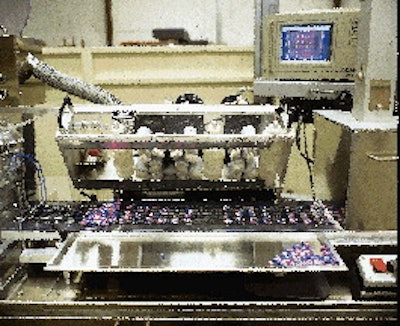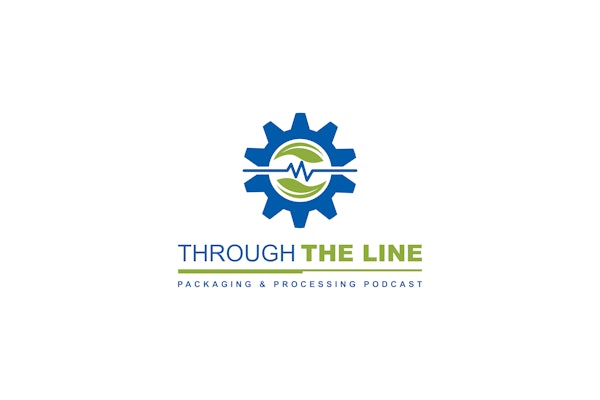As a contract packager of pharmaceutical products specializing in unit-dose packs, International Labs, St. Petersburg, FL, must have fast-changeover thermoform/fill/seal blister packaging equipment. However, the company also must scrutinize equipment capital costs. When it needed to add a fourth tf/f/s blister packing system a year ago to expand capacity, it chose a MAC III Super 2000 intermittent-motion machine from Modular Packaging Systems, Inc. (Pine Brook, NJ).
"We were focused on [buying] a cost-effective machine that would provide us with maximum output but in a quick-changeover type environment," says Tim Wojdan, vice president of operations. He estimates the Argentine-built machine costs $25ꯠ to $50ꯠ less than many comparable machines the firm considered.
The machine produces blister packs for products such as over-the-counter zinc capsules for customers like Alto Pharmaceuticals, Reddington Shores, FL. That product is packaged in a 2x10 blister configuration using 10-mil polyvinyl chloride and a peelable, paper-backed foil.
Quality, too
Just because the machine costs less than others doesn't mean the quality isn't there, according to Wojdan. "The quality is very much there. Plus they run forever. We've got two other MACs, and the oldest is well over ten years old. It's still in daily service five days a week with two shifts."
Fast changeover is another key feature of the machine. A complete cleaning, changeover (including form/seal tooling, perforation station and print plates) and set-up takes about three hours with one person. That's faster than other machines the company looked at. Changeover requires minimal tools and makes extensive use of handwheels and quick-release knobs. International Labs changes over the machine once every two to three days.
Wojdan emphasizes how easy the machine is to clean. "Everything is three hundred-series stainless steel, and all product contact surfaces are easily removable and cleanable with minimal change parts," he says.
The firm is able to run a wide range of blister card sizes on the machine, with anywhere from one to 24 tablets per card. It also accommodates a variety of PVC, polyvinylidene chloride and barrier-coated films in a range of thicknesses. Lidding can range from straight push-through foil to child-resistant peel/push foil laminations.
Running two-up
In operation, International Labs typically runs the machine at a speed of 30 to 35 cycles/min, typically two blister cards per cycle, as is the case with Alto's 2x10 blister format. For tablets that are automatically fed, the machine typically requires one operator both to replenish capsules and to pack off finished blister packs. Two operators are used for products that need to be manually loaded into blister cavities.
First, plastic sheet unwinds from rollstock and advances through a pre-heating stage. Next, the material flows over an aluminum forming die. A vacuum removes air from the die's cavities, drawing the material down into the cavities to form the blisters. The machine does have plug-assist capability, which mainly is used for cold-forming foil, says Wojdan.
Next, the web advances to the feeding area. The machine has an elongated feeding area that Wojdan likes because some products-oblong items or sticky gel capsules, for example-don't lend themselves well to automatic feeding and have to be hand-fed. "We can put two operators at the machine hand-feeding," says Wojdan.
For capsules like Alto's, a brush-box feeder is used. It employs a series of rotating brushes to distribute the capsules into the cavities. The machine will also accommodate a channel-type feeder that International Labs uses for tablets. That type of feeder feeds tablets through a series of channels directly into each cavity.
"It lends itself to a wide variety of feeding systems. That was one of the selling points to us," says Wojdan.
After capsules are deposited into cavities, the web passes beneath a PC-based machine vision system that came with the tf/f/s machine. Its camera records all tablets that pass and instantly transforms the images into digital information that's analyzed by the PC. If a tablet is missing or broken, the PC signals the machine's PLC to track and reject the entire cycle of blisters (two, in the case of Alto) after sealing and cutting.
Meanwhile, foil lidding can be supplied preprinted or blank for on-line printing via a Hapa flexo printer, available in the U.S. from Romaco (Morris Plains, NJ). Depending on customer requirements, that printer produces everything from a simple lot and expiration date to an ingredient and directions statement, even company name and logo. Alto's zinc product uses preprinted lidding.
The foil lidding is then sealed to the PVC web through heat and pressure. A photoeye ensures that the printed foil is aligned in register to the formed cavities of the PVC web. After heat-sealing, the web passes through a cooling station that uses a refrigerated plate to cool the top web material to minimize the potential for distortion or delamination. Off-line seal integrity checks are performed periodically.
Next, the web enters the perforation station, followed by trimming, where the individual cards are punched out of the web. Scrap material is rewound onto a take-up reel.
Individual blister cards emerge from the machine onto a rotary pack-off table. Operators manually pack the blister cards onto in-process trays for delivery to the cartoning area. For the Alto product, 10 blister cards are packed into a carton.
Since International Labs has been using MAC machines for more than 10 years, the company has developed a considerable amount of in-house expertise on maintaining the machine, so obtaining outside service hasn't been much of an issue. Even so, now that Modular Packaging sells and services the equipment (since June 1998), Wojdan says service is even better. "With Modular Packaging getting involved, the advantage is that some of the more exotic service that might be needed is now available in the U.S."
International Labs is pleased with the overall combination of performance and cost. Uptime on the new machine is greater than 95%, according to Wojdan.
"There are several machines out there that address our needs. But MAC was the most cost-effective machine that changes over rapidly, cleans up easily, meets our validation requirements, and produces a high-quality unit-dose package."



















